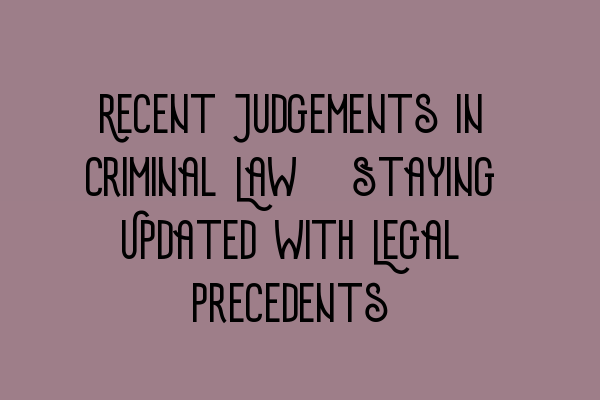Recent Judgements in Criminal Law: Staying Updated with Legal Precedents
In the ever-evolving field of criminal law, staying abreast of the latest legal precedents and judgments is crucial for legal practitioners. As a solicitor, it is not only important to provide the best possible representation for your clients, but also to maintain your professional development and continue honing your expertise.
The Significance of Legal Precedents
Legal precedents serve as important guidelines for future court cases. They provide a framework for interpreting and applying the law, ensuring consistency and fairness in the legal system. By being aware of and understanding recent judgments in criminal law, you can effectively argue your case and anticipate the strategies employed by opposing counsel.
Impact on Criminal Law Practice
Each new judgment in criminal law can have a profound impact on the way cases are handled. For instance, a landmark ruling might establish a new legal principle, alter the interpretation of existing statutes, or clarify the scope of certain defenses. By keeping up with these developments, you can tailor your defense strategies to align with the evolving legal landscape.
How to Stay Updated
Staying updated with recent judgments in criminal law requires proactive effort on your part. Here are a few strategies to help you stay in the know:
- Regularly check legal databases: Subscribe to reputable legal databases that provide access to case law. These platforms often have search functions that allow you to filter judgments by jurisdiction, court level, and practice area.
- Follow legal publications and journals: Many legal publications and journals feature articles and commentary on recent judgments and their implications. Subscribing to these publications and reading them regularly can provide valuable insights.
- Attend legal seminars and webinars: Stay engaged with professional development opportunities by participating in legal seminars and webinars. Experts often discuss recent developments in criminal law during these events, allowing you to gain a comprehensive understanding of the impact.
- Join legal associations and discussion forums: Engage with fellow legal professionals by joining associations and discussion forums dedicated to criminal law. These platforms often foster discussions about recent judgments and provide an opportunity to exchange ideas and insights.
- Consult with colleagues and mentors: Don’t underestimate the power of peer-to-peer learning. Engage in conversations with experienced colleagues or mentors who can share their perspectives on recent judgments and their practical implications.
By combining these strategies, you can create a comprehensive approach to staying updated with recent judgments in criminal law. This dedication to ongoing learning and professional development will undoubtedly enhance your legal practice and client representation.
Continuing Professional Development (CPD) and SQE Preparation
As the upcoming Solicitors Qualifying Examination (SQE) replaces the old qualifying routes, it becomes even more crucial to stay updated with the evolving landscape of criminal law. To ensure success in the SQE and maintain your professional standing, consider taking advantage of SQE 1 and SQE 2 preparation courses. These courses are designed to equip you with the necessary knowledge and skills to pass the examinations.
For SQE 1, engaging in practice exams and mocks is essential to familiarize yourself with the exam format and assess your knowledge. You can access SQE 1 practice exam questions and SQE 1 practice mocks FLK1 FLK2 to enhance your preparation.
Furthermore, SQE 2 preparation courses can help you deepen your understanding of criminal law and strengthen your ability to apply legal principles in practical scenarios. Being well-prepared for the SQE exams not only demonstrates your competence to potential employers but also ensures you are up to date with the current legal precedents in criminal law.
Conclusion
Staying updated with recent judgments in criminal law is an essential aspect of being a successful solicitor. By actively seeking out and engaging with legal precedents, you can navigate the complexities of the legal system with greater confidence and efficacy. Remember to regularly check legal databases, follow legal publications, attend seminars, join associations, and consult with colleagues to maintain your professional development.
For those preparing for the upcoming SQE, integrating comprehensive SQE preparation courses into your study plan is highly recommended. Visit SQE 2 Preparation Courses and SQE 1 Preparation Courses for more information on how to excel in the examinations.
Best of luck in your pursuit of legal excellence!
